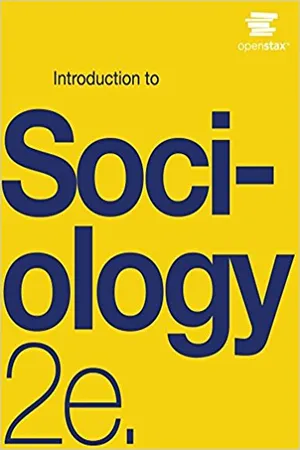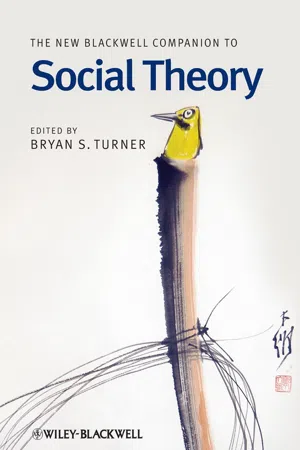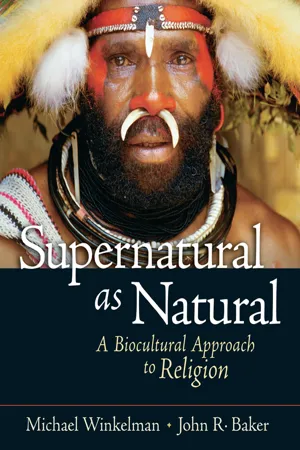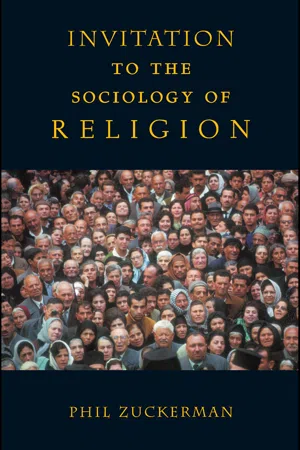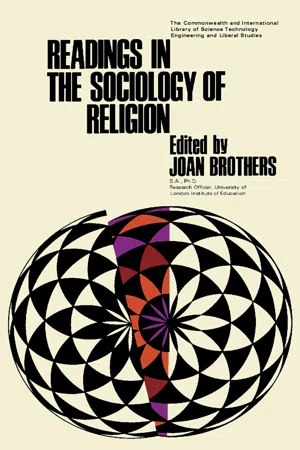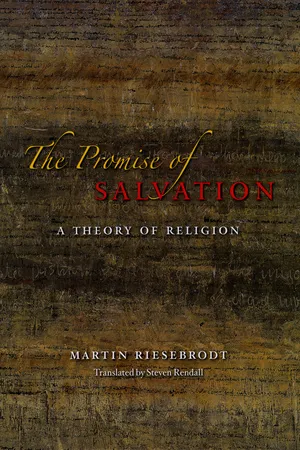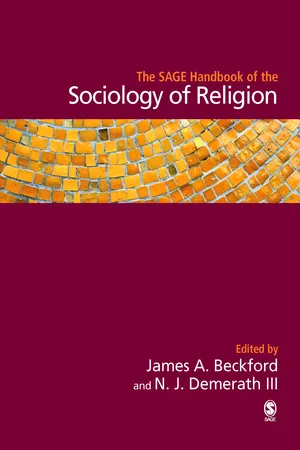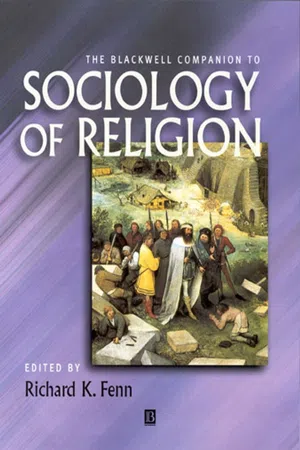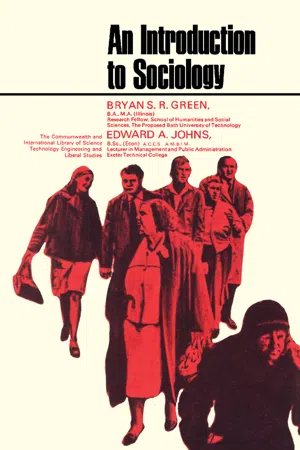Social Sciences
Society and Religion
Society and religion are interconnected aspects of human culture and behavior. Religion often plays a significant role in shaping societal norms, values, and institutions, while society provides the context in which religious beliefs and practices are expressed and maintained. The relationship between society and religion is complex and varies across different cultures and historical periods.
Written by Perlego with AI-assistance
Related key terms
1 of 5
9 Key excerpts on "Society and Religion"
- eBook - PDF
- Heather Griffiths, Nathan Keirns, Eric Strayer, Susan Cody-Rydzewski, Gail Scaramuzzo, Tommy Sadler, Sally Vyain, Jeff Bry, Faye Jones(Authors)
- 2015(Publication Date)
- Openstax(Publisher)
He went on to elaborate: Religion is “a unified system of beliefs and practices relative to sacred things, that is to say set apart and forbidden, beliefs and practices which unite into one single moral community, called a church, all those who adhere to them” (1915). Some people associate religion with places of worship (a synagogue or church), others with a practice (confession or meditation), and still others with a concept that Chapter 15 | Religion 333 guides their daily lives (like dharma or sin). All these people can agree that religion is a system of beliefs, values, and practices concerning what a person holds sacred or considers to be spiritually significant. Does religion bring fear, wonder, relief, explanation of the unknown or control over freedom and choice? How do our religious perspectives affect our behavior? These are questions sociologists ask and are reasons they study religion. What are peoples' conceptions of the profane and the sacred? How do religious ideas affect the real-world reactions and choices of people in a society? Religion can also serve as a filter for examining other issues in society and other components of a culture. For example, after the terrorist attacks of September 11, 2001, it became important for teachers, church leaders, and the media to educate Americans about Islam to prevent stereotyping and to promote religious tolerance. Sociological tools and methods, such as surveys, polls, interviews, and analysis of historical data, can be applied to the study of religion in a culture to help us better understand the role religion plays in people’s lives and the way it influences society. 15.1 The Sociological Approach to Religion From the Latin religio (respect for what is sacred) and religare (to bind, in the sense of an obligation), the term religion describes various systems of belief and practice that define what people consider to be sacred or spiritual (Fasching and deChant 2001; Durkheim 1915). - eBook - PDF
- Bryan S. Turner, Bryan S. Turner, Bryan S. Turner, Bryan S. Turner(Authors)
- 2009(Publication Date)
- Wiley-Blackwell(Publisher)
This emphasis on the social setting and social con-sequences of religion, and persuaded by Tylor’s argument that a narrow definition of religion as belief in a supreme being would exclude tribal beliefs in spiritual beings (2001 [1912]: 31), led Durkheim to offer an expansive definition of the sacred. Durkheim argued that all religions make a classificatory distinction between the sacred – all those things set apart and forbidden – and the profane (2001 [1912]: 36), and what is deemed sacred does not inhere in the thing itself but is so defined by the particular society: “What makes a thing holy is . . . the collective feeling attached to it” (2001 [1912]: 308). “Since neither man nor nature is inherently sacred, this quality of sacredness must come from another source” (2001 [1912]: 76), and that source is society. Hence, “it is the unity and the diversity of social life that creates both the unity and the diversity of sacred beings and things” (2001 [1912]: 309). Durkheim also explicated a clear definition of what constitutes religion as a social practice, stating, “Religious phenomena fall quite naturally into two basic catego-ries: beliefs and rites. The first are states of opinion and consist of representations [symbols]; the second are fixed modes of actions [specific practices]” (2001 [1912]: 36). What we believe, or what we worship, and how we worship comprises the domain of religion. And not surprisingly, following Durkheim’s emphasis on the collective nature of social life, religious beliefs and rites or rituals are not unique to the individual but are, and must necessarily be, shared collectively: Religious beliefs proper are always held by a defined collectivity that professes them and practices the rites that go with them. These beliefs are not only embraced by all the members of this collectivity as individuals, they belong to the group and unite it. The individuals who make up this group is bound to one another by their common beliefs. - eBook - ePub
Supernatural as Natural
A Biocultural Approach to Religion
- Michael Winkelman, John R. Baker(Authors)
- 2015(Publication Date)
- Routledge(Publisher)
The structural–functional approach of Evans-Pritchard does not fully embrace Durkheim’s view that religion is defined by the sacred, nor does it completely reject the intellectualist view that religion is a belief in supernatural beings. His work shows how religious beliefs are related to the structures of society. He argues that this is the influence of social structure on religion, rather than a social determination of the beliefs and ideas regarding spirits.Religion as a Cultural System
In his classic article “Religion as a Cultural System,” Clifford Geertz (1966) integrates the intellectualist concern over the explanatory role of religion with the functionalist perspective. In doing so, Geertz provides a broad and all-encompassing definition of religion that incorporated the intellectual, emotional, symbolic, and social aspects of religion as part of the total world-view of a culture. Geertz’s definition, which has resonated with many anthropologists, sees religion as “(1) a system of symbols which acts to (2) establish powerful, persuasive, and long-lasting moods and motivations in men by (3) formulating conceptions of a general order of existence and (4) clothing these conceptions with such an aura of actuality that (5) the moods and motivations seem uniquely realistic” (Geertz 1966).A key aspect of Geertz’s conception of religion is its role as a symbol system—a system of interconnected meanings that function to express the essence of a culture’s worldview and ethos, encompassing such diverse domains as morals, character, values, aesthetics, and cosmology. The principal function of religion is to illustrate the conformance between everyday life and the ideal view of the Universe that is depicted in a culture’s cosmology. Religious rituals provide mechanisms to make this connection emotionally convincing, giving people a certainty that the general principles in which they believe actually operate in the Universe. Religion projects a cosmic order that serves as a general model of the Universe, and then socializes human beings to help to ensure that people’s morals, emotions, and judgments conform to these ideals.Symbol System - eBook - ePub
- Phil Zuckerman(Author)
- 2010(Publication Date)
- Routledge(Publisher)
How could it be otherwise? Well, there you have it: my explanation of what sociology is all about. Now I’ll discuss how the above aspects of sociology relate specifically to religion.1. Sociologists study social groups .
Religions are, if nothing else, social groups. Whether it be college students who meet in their dorm rooms once a week for Bible study or established congregations, a handful of pagans who gather in the woods at summer solstice or million-member denominations, religious bodies are quite obviously social collectives. When one is studying the dynamics of group affiliation and the formation of social confederacy, religious groups clearly provide excellent samples.2. Sociologists study social interaction .
Religion may entail interaction with the divine, but it also entails interaction among humans. Circumcisions, pilgrimages, christenings, bar mitzvahs, confessions, peyote ceremonies, church picnics—religion is dripping with social interaction. Ever since Émile Durkheim’s classic treatise The Elementary Forms of the Religious Life (1915)— in which Durkheim posited that social interaction was actually the source, the very cause of religion—sociologists have paid careful attention to the rich and dramatic varieties of social interaction that compose religious phenomena.3. Sociologists study social institutions and social structures .
Religion—by definition—is a social institution. And in many parts of the world, religion is one of the most powerful, all-pervasive social institutions out there. It thus makes sense that many of the founding sociologists such as Émile Durkheim, Max Weber, George Simmel, W.E.B.Du Bois, Charlotte Perkins Gilman, and Friedrich Engels wrote and theorized extensively about religion. Sociologists of religion are interested not only in analyzing religion as a social institution in its own right, but also in understanding how religion influences, and is influenced by, other major social institutions. For instance, the single most famous and widely recognized seminal study within the sociological canon is Max Weber’s The Protestant Ethic and the Spirit of Capitalism - eBook - PDF
Readings in the Sociology of Religion
The Commonwealth and International Library: Readings in Sociology
- Joan Brothers, A. H. Richmond(Authors)
- 2013(Publication Date)
- Pergamon(Publisher)
cit., p. 147. 3 8 Ο. H. v.d. Gablentz, Religion. Article in: Wörterbuch der Soziologie (eds. W. Bernsdorf and F. Bülow), Stuttgart, 1955, p. 414. 8 9 Yinger, op. cit., p. 9. 4 0 Schelsky, op. cit., p. 156. See also Schelsky, Religionssoziologie und Theologie. In: Zeitschrift f. evangelische Ethik, 1959, No. 3, p. 135. 44 P. H. VRIJHOF subjected to sociological analysis. Schelsky leaves it in n o d o u b t , however, t h a t h e is concerned with adaptations of doctrine a n d the form of faith. O n e is left with the impression t h a t he w o u l d like the real essential content of religion to be excluded from consideration. If religion by its very being is regarded as a n encounter with a s u p e r n a t u r a l p o w e r , 4 1 the sociology of religion as a h u m a n science c a n h a r d l y do otherwise t h a n concern itself with those aspects w h i c h c a n b e perceived in this world, with the consequences of such a n encounter. This line of t h o u g h t leads to sociological-functional définitions of religion, of w h i c h the best k n o w n is Milton Yinger's. H e says that religion is a system of beliefs a n d practices by m e a n s of which a g r o u p of people struggle w i t h these ultimate problems of h u m a n life: knowledge of d e a t h a n d of suffering, a n d generally of the powers w h i c h threaten h u m a n life a n d happiness. Yinger further characterizes religion as a n organised effort to m a k e virtue of our ultimate necessities. 42 T a l c o t t Parsons similarly sees religious ideas as answers to the problems of m e a n i n g . O n the one h a n d they concern the cognitive definition of the situation for action as a whole, o n the other h a n d , however, they must include the problems of m e a n i n g in the larger philosophical sense, of the m e a n i n g of the objects of empirical cognition, of n a t u r e , h u m a n n a t u r e , society, the vicissitudes of h u m a n life, e t c . - eBook - PDF
The Promise of Salvation
A Theory of Religion
- Martin Riesebrodt, Steven Rendall(Authors)
- 2010(Publication Date)
- University of Chicago Press(Publisher)
On the one hand, Durkheim argues that religion is an eminently social phenomenon; on the other, he argues that almost all mental categories and institutions developed out of religion. In other words, neither religion nor society has priority over the other; instead, they mutually produce each other. Likewise, Durkheim equates religion with the sacred. The social can develop only on the basis of the distinction between the sacred and the pro-fane. Without distinguishing between the sacred and the profane, what is commanded and what is forbidden, what is sanctioned and what is not sanc-tioned, society cannot be formed. For Durkheim, religion is equivalent to the sacred insofar as it founds and maintains community. Religion refers to the sacralized central cognitive, moral, and aesthetic principles and classifica-tions without which cooperation and coordination would not be possible. For Durkheim, human beings and society have two dimensions, a pro-fane and a sacred. Man is profane in his bodily needs and desires, in his egotism and self-centeredness. He is sacred as a moral, social being who scholarly imaginations of religion 63 is able to transcend these limitations. Society is profane in its everyday economic life, which primarily serves the needs of physical reproduction. Even though Durkheim shows that economic orders are regulated morally, everyday life is still very distant from high religious festivals and rituals, in which the central symbols of social principles and ideals are invoked and people’s hearts are moved. For Durkheim, a society based on utilitarian self-interest, that is, a fully profane society, cannot exist and represents a contradiction in terms. Society always has a sacred dimension and thus a re-ligion. Society constantly creates ideals, and the ideal society is a necessary component of real society—and not a sort of accidental addition. - James A Beckford, Jay Demerath, James A Beckford, Jay Demerath(Authors)
- 2007(Publication Date)
- SAGE Publications Ltd(Publisher)
It is a generic term that refers to a wide range of phenomena extending from, at one extreme, entire faith traditions such as Islam or Christianity to, at the other extreme, the personal convictions and commitments of individuals. In between these two extremes there are many different types of religious insti-tutions, organisations, groupings and practices. Although it is convenient to use the word ‘religion’ as a shorthand way of referring to this vast array of differing values, beliefs, symbols, rituals, teachings, practices, experi-ences, forms of organisation and ethical rules, we must always keep this sheer diversity in mind. Good sociological analysis of religion requires us to be sensitive to this diversity and to the variable rates at which religious phenomena can change. The third note of caution is about the com-plications that arise when the distinction between religious organisations and other agencies is unclear. It sometimes happens, for example, that religious organisations act as proxies for political interests in attempting to regulate social and cultural life. Such cases look like regulation by religion, but they actu-ally mask the influence of non-religious forces. Conversely, of course, some political authori-ties may appear to be acting independently whilst actually carrying out the wishes of pow-erful religious organisations. The challenge for social scientists is, therefore, to assess the extent to which religion is a proxy for other interests, and vice versa , in any particular circumstance. The term ‘regulation’ in this context means the process of directing or controlling things in accordance with rules. Following Hood et al . (2001), we can identify three aspects of this process: information gathering, standard set-ting and behaviour modification.- Richard K. Fenn(Author)
- 2008(Publication Date)
- Wiley-Blackwell(Publisher)
Anthropologists, while still focus-ing more often on socioeconomically marginalized groups and cultures, are now increasingly doing their work in all parts of the world, not just in those geo-graphically separate from the dominant West. The difference between “here” and “elsewhere” is no longer clear. In effect, many social scientists have come to the realization that a world society has been emerging for quite some time, and that in this context cross-cultural work takes on a new and somewhat different importance: it is an unavoidable task if we are to understand how the obvious social and cultural differences that exist around the world can still be part of a single social unit; and vice versa, how we are to understand and, indeed, main-tain differences if there is now but one worldwide society. The new situation – or perhaps better, the new realization – does not mean that the social sciences have been entirely wrong in their approaches, including their approach to religion. What it does imply is that an adequate social theory for understanding religion in the contemporary world has to revisit and in many cases seriously revise some of the most basic assumptions of the past. The cross-cultural study of religion, like cross-cultural work more generally, will undergo a corresponding transformation. That said, we can now turn to a closer look at how this broad context has manifested itself in social theories of religion. Sociological and Anthropological Conceptions of Religion Most introductory textbooks in the sociology of religion begin with a discussion of definitions, noting the lack of agreement and the many definitions, and gen-RELIGION IN CROSS-CULTURAL PERSPECTIVE 421 erally dividing these into two types, substantive and functional. Briefly, substan-tive definitions focus on what religion is , whereas functional definitions try to say what religion does. Anthropologists and sociologists have each offered several of both varieties.- eBook - PDF
- Bryan S. R. Green, Edward A. Johns(Authors)
- 2013(Publication Date)
- Pergamon(Publisher)
Most of the terms are familiar in everyday language and there are no esoteric formulae to be learned. 38 SOME SOCIOLOGICAL DEFINITIONS 39 We said in the first chapter that the sociologist is concerned with regularities in social life. As applied to individuals involved in social behaviour the search for regularities can move in three directions. In the first place one can study social behaviour in terms of cultural regularities such as rules of behaviour, customs, values or beliefs. Cultural elements exist as objective facts embodied in written or spoken language which impinge upon the individual as restraints or guides to behaviour; they also exist as personality factors which have been internalized through social learning processes. Thus there is an overlap with a second direction for sociological inquiry, viz. the interpretation of social behaviour in terms of underlying personality factors such as attitudes, opinions, needs and goals. A third direction is to concentrate on the way specific social acts cohere as patterns in collectivities of individuals. Regular patterns of behaviour performed by individuals as mem-bers of collectivities are called roles which are limited to specific positions. When we have two or more role-positions forming a persistent unit of interaction then we may refer to a social system. When the concern is with the positions, i.e. the static aspect of a social system, then we refer to a social structure. Quite often the social structure of a particular collectivity is presented diagram-matically as a set of boxes or circles connected by lines showing the kind of relationship which exists within the set of positions. The clearest examples occur in studies of formal organizations where positions are officially defined for administrative purposes. The smallest type of social system consists of two actors and is called a dyad.
Index pages curate the most relevant extracts from our library of academic textbooks. They’ve been created using an in-house natural language model (NLM), each adding context and meaning to key research topics.
